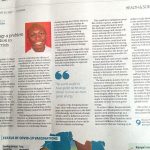Over the years, I have worked with multiple projects on onboarding clients, mostly Medium to Small Market Enterprises (MSMEs) into their programmes. Through the onboarding processes, I have mobilized a cumulative number of more than 50,000 applications from all over Africa. Unfortunately, due to the capacity of these incubators, donor organisations and sometimes the private sector, most of these applicants end up not being onboarded and thus do not receive the much-needed support that they are looking at. I have also worked with these organisations in media liaison all over Africa and identifying and engaging subject-matter social media influencers to not only publicise the call for applications, but also in agenda setting in specific areas of interest.
Despite the foregoing, I have noticed and worked within programmes that have previously faced humongous challenges in identifying which MSMEs to work with and how they can reach out to them. How I have circumnavigated this is by continually building a database of these entrepreneurs over the years. Once an organization has had a conversation/application from an entrepreneur, it is kind that they store their details in their database and contact them in case of an interesting opening in future. Remember, these entrepreneurs are always looking for different kinds of support, from technical assistance to financing/resource mobilization. The other factor that has seen me successfully mobilise quality applications is by collaborating with other partners in this space. Tens of organisations that I know have databases that they use to contact potential clients/beneficiaries and they are always willing to share any opening that would potentially benefit these beneficiaries.
Call for applications strategies
There are a few ideas that as an organization you can tap into. I mentioned about collaborating with allied organisations, working with influencers and using the mainstream media to send out information about your call. There is also the idea of sending bulk emails, but only if you have this database and ensuring that you do not contravene country or region-specific rules like GDPR among other policies. The digital front like social media and other online platforms also offer a strong reach to your target audience. Think also about communities with the kind of applicants that you will be looking at. While these only highlight the platforms, it is imperative to have very rich and catchy content to share in these platforms. These include social media copies, email templates and platform-specific content developed in form of text, graphics/images and short videos. Remember to localize the language that you will be using.
The onboarding process
Onboarding processes vary significantly according to organisations need and what specifically you are looking at. Previously, I have found it easy creating a call for applications paradigm that contains elaborate guidelines of what is needed from the applicants as well as the evaluation criteria. It is vital to communicate this kind of information beforehand to inform the applicants whether they fit the bill or not and whether they need to lodge their applications or not. Secondly, have a mechanism of receiving applications. This could be by creating an online portal (which can actually be customized to sift and qualify applications based on the minimum requirements). For those targeting applications from very remote areas, it could be simply a form that is filled (probably with the help of your staff) and dropped at specified collection points.
The other onboarding strategy that has worked well for me is by coming up with challenges, where applicants apply with their ideas/projects, they are sifted through by a panel of experts and several finalists go through a pitching competition. I have ran several of them as noted hereafter and by owning the entire process I realise that this is not only an interesting process, but one that also exposes the finalists to more partners, and it is an open process for those who may not qualify.
Notable applications mobilized
Collaboratively, while working with KCL, I worked with development partners from Africa Development Bank (AfDB) and Global Center on Adaptation to mobilise 2,010 applications into their #YouthADAPT programme, part of the Africa Adaptation Acceleration Program (AAAP) that seeks to promote the capacity of young entrepreneurs in Africa to provide innovative solutions to climate adaptation and resilience. From the 2,010 applicants, 10 are already benefitting from mentorship and financing of up to USD 100,000 each. I also mobilised a call for applications targeting 300 youth entrepreneurs in the forestry and agroforestry value chains. 40 of these were supported by the Green Economy Youth Activation Program (GrEYAP) funded by United Nations Development Programme (UNDP) through KCIC.
The No Waste Challenge by What Design Can Do and IKEA Foundation and implemented by KCIC is also another call I ran that garnered 118 unique projects. Other calls that I ran in Kenya include the AgriBiz programme by DANIDA and EU that has since received over 45,000 applications, the 47-Champions Awards that had applications from 45/47 counties in Kenya, ClimateLaunchpad Kenya Chapter that takes place annually and Green Growth Empowerment Programme among others.
Considering the foregoing, it is crucial for incubators and development organisations to engage with experts in order to receive quality applications for their programmes. The expert will customise strategies depending on the kind of applications that the incubator/donor organisation is looking at receiving, the sector and the target audience. In case you wish to receive more insights regarding this topic, feel free to reach out to me on consult@solomonirungu.com or call me on +254725961921.
Read also:
Challenge for youth entrepreneurs launches in Africa
Agribusiness programme spreads wings to Machakos



